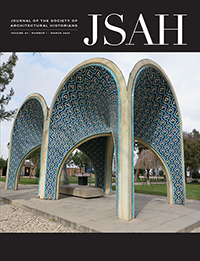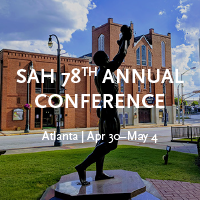-
Membership
Membership
Anyone with an interest in the history of the built environment is welcome to join the Society of Architectural Historians -
Conferences
Conferences
SAH Annual International Conferences bring members together for scholarly exchange and networking -
Publications
Publications
Through print and digital publications, SAH documents the history of the built environment and disseminates scholarshipLatest Issue:

-
Programs
Programs
SAH promotes meaningful engagement with the history of the built environment through its programsMember Programs
-
Jobs & Opportunities
Jobs & Opportunities
SAH provides resources, fellowships, and grants to help further your career and professional life -
Support
Support
We invite you to support the educational mission of SAH by making a gift, becoming a member, or volunteering -
About
About
SAH promotes the study, interpretation, and conservation of the built environment worldwide for the benefit of all
Program Date: June 7, 2023
Chat Transcript
Recent scholarship in architectural history has poignantly articulated the role of architecture in shaping development discourses and practices in the post-World War II period, demonstrating the critical place of architects as “epistemic authorities,” technical experts, and managers in efforts to reconfigure the future of territories, resources, and infrastructures (Aggregate, KTH Conference, Levin, Stanek). Although there is a tacit understanding that architecture was both an instrument and an object of development politics, there is little focus on the media that created, established, challenged, and disseminated architectural expertise.
This panel will open a conversation on how media such as photographs, census, maps, diagrams, questionnaires, and manuals tainted and framed development projects. What kind of media did technical experts and architects use? What kind of biases did those media carry and how did those limitations shape development discourses? Media and communication infrastructures were crucial components of the development dispositif, allowing for the circulation of projects and expertise, but media also became the living record of development projects, the archives from which architects and foreign experts drew resources and knowledge. In this sense, we will also invite the presenters to discuss how these media complicate the historical task at hand, since our historical knowledge of the period relies on the archives they inhabit.
The roundtable brings together historians of architecture and the built environment to explore the use—and abuse—of media in 20th-century development politics, geographically ranging from South America to Africa and Asia. Each of the six participants will offer a five-minute presentation on one medium they encountered in the field or the archives, and discuss how media techniques and their limitations shaped development discourses and practices. Ateya Khorakiwala will present on photographs in South Asia, Elis Mendoza on manuals in South America, Ginger Nolan on puppet shows in South Asia, Nushelle de Silva on traveling exhibitions in the Global South, and Ikem Stanley Okoye on documentary films in Africa. The presentations will be followed by a moderated discussion grounded on two to three questions that will discuss media biases and limitations, the historiographical problems that arise from the use of media as evidence, as well as the role of international organizations and private institutions in shaping those documentation practices. We will open the floor to a larger conversation involving the audience after 15 to 20 minutes. The goal is to demonstrate how media influenced the establishment of development institutions and actors, the educational structures, contents as well as subjectivities, and ultimately the formation of archives and what we know about development today.
Panelists
- Ateya Khorakiwala, Ph.D., Assistant Professor at Columbia GSAPP
- Elis Mendoza, Doctoral Candidate at Princeton University School of Architecture
- Ginger Nolan, Ph.D., Assistant Professor at USC School of Architecture
- Nushelle de Silva, Doctoral Candidate at Massachusetts Institute of Technology
- Ikem Stanley Okoye, Ph.D., Associate Professor at University of Delaware
Moderators
- Frederike Lausch, Ph.D., Research Associate at Technical University of Darmstadt, Fellow at the University of Arizona
- Olga Touloumi, Ph.D., Assistant Professor at Bard College
Speakers

Ateya Khorakiwala is assistant professor of architecture at Columbia University GSAPP. Her current book project, Famine Landscapes, is an infrastructural and architectural history set in India’s postcolonial countryside. She has published in e-flux Architecture, CSSAAME, Grey Room, and the Journal of Architectural Education. Khorakiwala is co-editor of the recent Aggregate publication, Architecture in Development: Systems and the Emergence of the Global South (Routledge, 2022).

Elis Mendoza is a Ph.D. candidate in architecture history and theory at Princeton University. Her dissertation traces a history of architecture experimentation within the incipient humanitarian government of the 1970s. She works in the intersection between built space, technology, and human rights with a special focus in post-conflict cities.

Ginger Nolan is an assistant professor at the University of Southern California. Her research explores relationships between architecture, technologies, race, and governmentality. She has published Savage Mind to Savage Machine: Racial Science and Twentieth-Century Design (2021) and The Neocolonialism of the Global Village (2018), both with the University of Minnesota Press.

Nushelle de Silva received her Ph.D. in architectural history from MIT in 2022. Currently a postdoctoral fellow at Ithaca College, she will join Fordham University as assistant professor in art history in 2023. Her research examines architecture as a transnational technopolitical infrastructure that mediates the movement of people, objects, and ideas.

Ikem Stanley Okoye is a widely published associate professor of art history at the University of Delaware. He has held fellowships at the Institute for Advanced Study, Princeton, at the Center for Modern Oriental Studies, Berlin, and from 2019 to 2022 was CCA/Mellon “Centring Africa” fellow working on his book manuscript, Where was Modernism?

Frederike Lausch is a postdoctoral research associate at Technical University of Darmstadt and co-founder of the Center for Critical Studies in Architecture (CCSA). She currently researches the Communication Centre of Scientific Knowledge for Self-Reliance in terms of how sustainable architectural practices emerged in engagement with development politics in the 1970s and 1980s.


